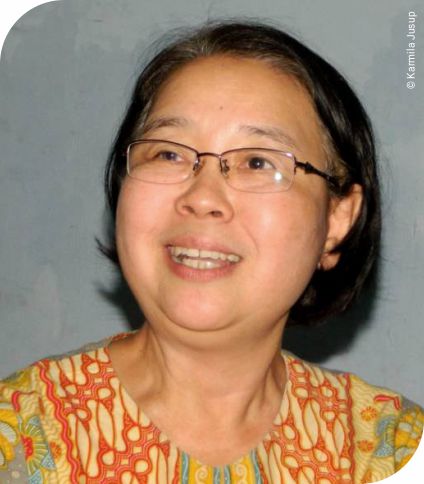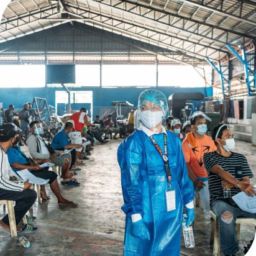

PROTECTING VICTIMS OF DOMESTIC VIOLENCE AMIDST A GLOBAL PANDEMIC
With the support of an EU-funded programme to combat violence against women, Karmila Jusup, founder of a crisis centre for victims of domestic violence, was able to continue to provide critical support to women migrant workers despite the challenges presented by the COVID-19 pandemic.
As a Christian woman of Chinese descent in a patriarchal family in the predominantly Muslim West Java, Jusup grew up experiencing regular discrimination. ‘My father openly regretted having me. He didn’t see the need to provide me with education as I am just a “girl”’, she said.
Jusup soon found refuge in her faith and became a priest in her local church in Bandung, West Java, but would have never imagined that she would encounter cases of violence against women there.
The congregation would gather every Sunday, ‘but after the service, I would have people coming to me with stories of violence’, she said. She took the stories to church management, but no one would believe her. It took her 13 years to convince both the church community and the local villagers to open the doors of the church complex for women who experienced violence.
The Pasoendan-Durebang Women’s Crisis Centre first opened in 2013 to cater to the needs of women within the church community and to support local survivors of domestic violence. Leveraging public advocacy and by connecting with similar organisations, Jusup worked tirelessly to raise awareness of the services provided by the centre and the pervasive issue of domestic violence. Due to their proximity to a migrant workers’ hotspot, the centre also became a safe haven for migrant workers who experienced violence abroad.
The centre currently covers four major destinations for Indonesian migrant workers: Hong Kong, Taiwan, Malaysia, and Korea. ‘We provide survivors with safe shelter, health services, counselling and legal services as needed’, Jusup said. ‘Anything we can help with, really.’
As the number of women seeking help grew rapidly, Jusup recognised the need to increase the capacity of the centre to provide better services for the survivors.
She has thus joined a network of over 60 civil society organisations (CSOs) in the ASEAN region under the Safe and Fair programme, an EU-UN Spotlight Initiative to eliminate violence against women and girls. Through Safe and Fair, Jusup received critical training on safe and fair migration, and on how to provide psychosocial, health, social and legal services to women migrant workers.
‘COVID-19 brought a new set of challenges to our centre’, Karmila said. ‘The number of survivors that require our help actually increased during the pandemic and we just simply cannot stop our services.’
While the influx of women migrant workers in need of shelter and support skyrocketed, the centre could only accommodate a limited number of survivors due to strict health and social distancing protocols
Government-imposed lockdown measures have also restricted Jusup’s ability to reach out to survivors, and the centre was forced to close temporarily. ‘I was worried and scared for these women’, Jusup said. ‘It was so hard to have to say no to them.’
Safe and Fair has helped Jusup make the services more easily accessible to survivors by opening a satellite shelter closer to the migrant workers’ hotspot. ‘The support could not have come at a better time.’
Safe and Fair is a regional programme implemented by UN Women, the International Labour Organization (ILO) and the UN Office on Drugs and Crime (UNODC) with a €25 million funding from the EU to strengthen the rights of women migrant workers in the region. On the policy level, the programme is working in Cambodia, Indonesia, Lao PDR, Myanmar, the Philippines and Vietnam to relevant revise laws and regulations to provide better protection for migrant workers and tackle violence against women and girls.
The programme has also partnered with governments, trade unions and CSOs to provide services to women migrant workers and their families through local service providers like Jusup and a network of Migrant Worker Resource Centre across ASEAN.






